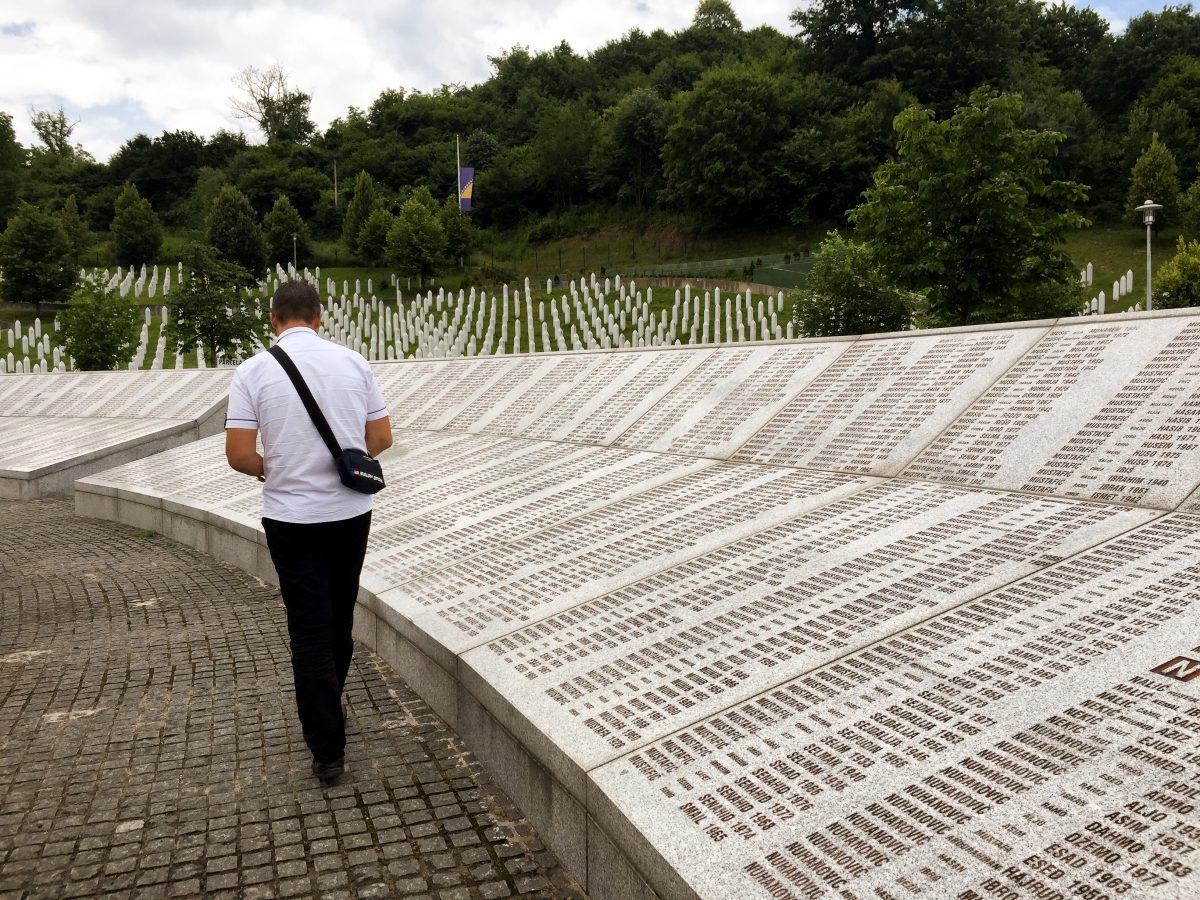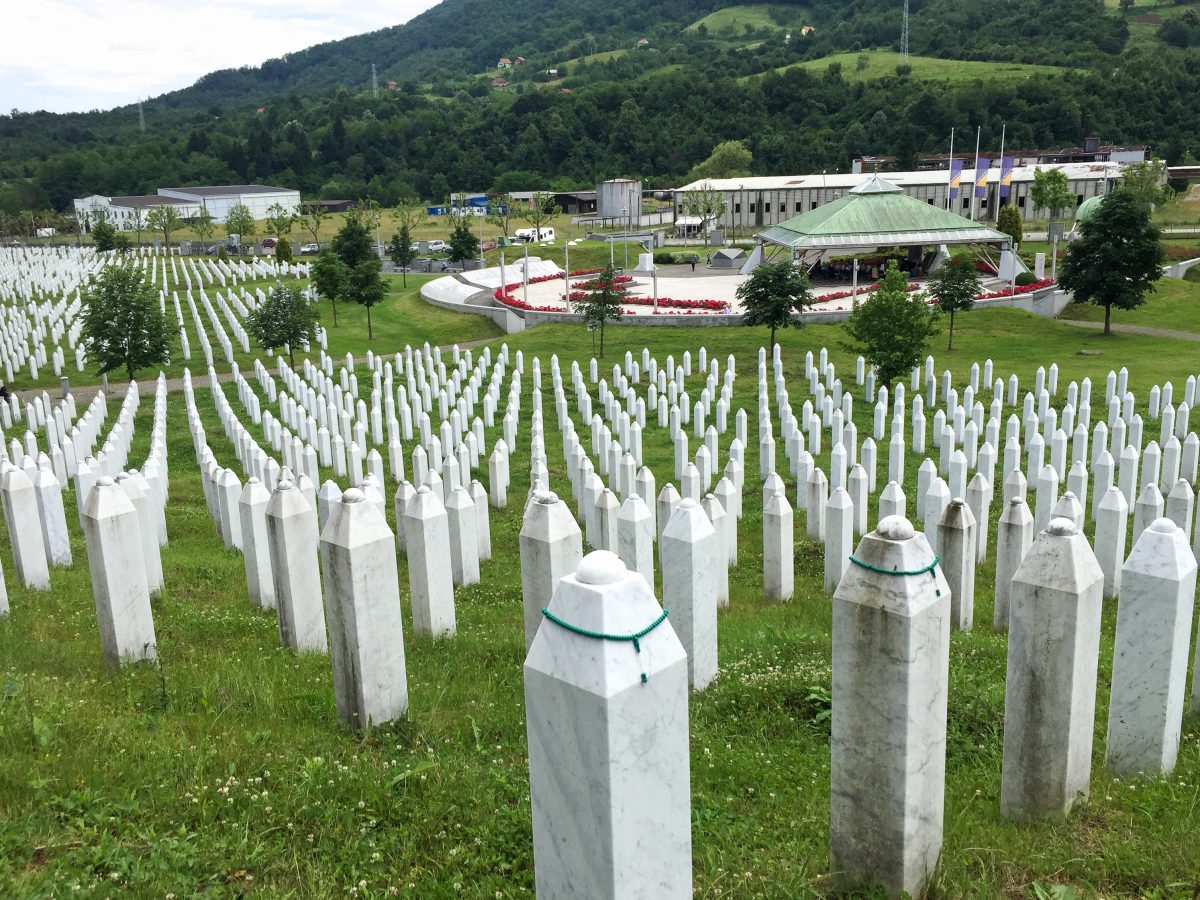Fikret Ibrakic stopped to read the seemingly unending stack of names etched into the slabs of stone before him. Although he had been at the memorial for the slain citizens of the Srebrenica village massacre multiple times before, he still had to take his time to find the exact ones he was looking for. After a moment of silent searching, he pointed to a cluster and said quietly and simply that those were his in-laws.
When Ibrakic speaks, the passion he holds for his country becomes obvious. He speaks with intensity, and his English is only slightly broken, an impressive feat when most of the adults in Bosnia can’t speak English, which he taught to himself when he was 30 years old. Ibrakic is in his 40s and fit, and his style of black slacks and fanny pack across his chest reflects the professional and prepared air that he is working towards. When looking at him, it would be hard to guess that 24 years ago, he was a soldier in the Bosnian army.
The Bosnian war began in May 1992 after the breakup of Yugoslavia, when Serbia decided to extend territory into Bosnia. This escalated into a genocide of Bosnian Muslims and ultimately led to the massacre of the village of Srebrenica where over 8,000 people were killed. The war lasted for three years until the United Nations created an agreement for the two countries, which gave Serbia a piece of Bosnia, now known as the Republic of Srpska. Since then, the two parts of Bosnia & Herzegovina have been forced to live together as one.
Ibrakic was one of many who fought to defend his country. Although he had the opportunity to escape to Germany, he calls himself a patriot who “needed to do something.” He wanted to keep his life and success in Bosnia, but says his biggest reason for fighting was his family.
“All my family is here, my mother and three brothers. What if one or all is killed? What would my life be? I will be killed or I will survive with them. . . and we all survived together,” he says.
Ibrakic was injured in battle when a bullet shot him in the leg — breaking it on site. He was out of the war for 18 months, but after recovery he went back to fighting. He says the scars still haven’t gone away.
“When you see someone who fought in the war, the first thought is he must be killing the enemy,” he says. “In many cases, it’s not like that. Waging a war isn’t years of constant killing.”
Ibrakic explains that war isn’t like the movies where “enemies come in and you shoot them.” There is either capture or kill, depending on the mission. He describes one time when he came face to face with three Serb soldiers, and though his group took them prisoner, they still gave the Serbians half their meals. If there was fair play, they would trade “their men for ours.”
However, he recalls shooting someone, and having the roles reversed. He says that “many people have suffered, had a terrible life, [and] terrible struggles.”
When the war did end, US forces hired Bosnians to work as miners in Afghanistan. Ibrakic spent the next seven years of his life there, where he started to teach himself English. By doing so, he was able to work up to being a translator. Since the war had ended Ibrakic has married and is the father of two sons. Both boys are learning English in school and his wife, Sadeta Ibrakic, has expressed how happy it makes her, especially because she can’t speak it.
The Ibrakic’s boys — like all Bosnian children — have grown up with the aftermath of the Bosnian War, and are expected to bridge the gaps between the older generations, even with the tensions that they created.
“It worries me a bit, I’m not sure that we as adults aren’t fueling the hatred,” Ibrakic said. “I’m not sure if we are teaching them to understand, to forgive, to mourn, and to go on. . .We can’t let our children hate, if we keep doing that we do nothing but push [them] into another war.”
His children are not hidden from the reality of the war, and Ibrakic speaks openly about his experience and opinions in front of them. Although the family has adjusted to life now, the war took from them all as well.
His wife, Sadeta Ibrakic, was a survivor of the massacre at Srebrenica in July 1995. At 17, she watched from a bus as Serbian soldiers separated out the boys and took away her 18-year-old brother.
The Red Cross found his remains fifteen years later in 2010 and 2011.
Although he is missing his jaw and one leg, his body has been buried at the Srebrenica memorial, along with two of her uncles. Only her father and one uncle survived.
Sadeta’s brother was described as tall and sporty, and had a black belt in karate. When the Ibrakic’s visited the Museum on the massacre next to the memorial, she saw the sport pants that had belonged to her brother on display. She now visits the memorial twice a year, but never on July 11, when there is a ceremony to remember and honor the victims; it is too emotionally difficult to go that day.
The land the memorial was created on was eventually given to Bosnia by the Republic of Srpska. Close to 7,000 bodies have been found and laid to rest at the memorial, but the Red Cross is still looking for at least 1,000 more.
After Srebrenica, Ibrakic now describes himself as nonreligious, even though his wife and family are practicing Muslims. He says he looks for excuses to be non-religious because he can’t understand why God would let these tragedies happen, he believes that the blame rests on the people.
“Genocide was created in an office. Sometimes we can do nothing against an earthquake. We choose to hurt or not hurt our neighbor,” he says.
Ibrakic has chosen to live his life according to that statement, and focuses on making Bosnia the next big tourist location. He says he always wanted to help his local community and country, and by bringing in foreigners he can help raise the income of the locals, as well as meet new people.
To do this, he owns four apartments and leases them out on Airbnb, which he discovered in 2014, even though he had the plan to host travelers since he was in Afghanistan.
“I was collecting souvenirs and was buying blankets in order to show it to my guests. My friends laughed to my plans but it came true,” he says.
Though his business has been slow in growing, Ibrakic isn’t discouraged. He says that he “has enough time.”
As an addition to renting out apartments, Ibrakic also offers a tour of Srebrenica and the memorial for an extra charge, though he says he wishes he could do them for free because in his eyes Srebrenica is “above business, profit, or any regular, everyday issues.” However, he has to charge in order to keep the tours going.
“Srebrenica must be shown to this generation as bloody warning of what we cannot let happen again,” he says.
Ibrakic also says that one of his goals is to educate the world about the war, but more specifically, the Netherlands.
After the war, the Dutch government had admitted that they could have done more to prevent the massacre in Srebrenica. According to an article in 2002 by The Guardian, the 110 peacekeeping Dutch troops responsible for protecting the village were vastly outnumbered by the Serbians and were incapable of stopping the slaughter. While the subject is still sore for a lot of Bosnians who blame the Dutch government for their limited actions, Ibrakic invites Dutch citizens to visit Srebrenica and the memorial.
“The message is, please come,” he said. “Please see. There is no revenge. Just please come, please cry. Please talk. If they come see, they can learn about the past, and the future so that nothing like this happens again, so they see we’re getting past it.”
Despite the hardships in Bosnia and Herzegovina’s past, Ibrakic is hopeful about his country’s future. He says that it’s important to talk about the genocide and to never forget it, but at the end of the day, they have to find a way to make their country successful.
“It’s painful, sad, and deep within us, but the past, crying, and playing the role of the victim doesn’t help when we send our children to school or do business,” he says.
An overlook of the Srebrenica memorial where 7,000 bodies have been buried









